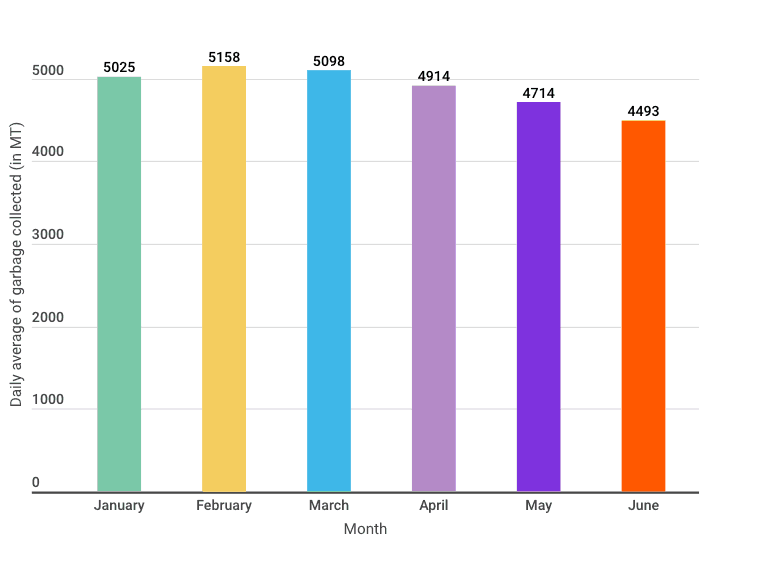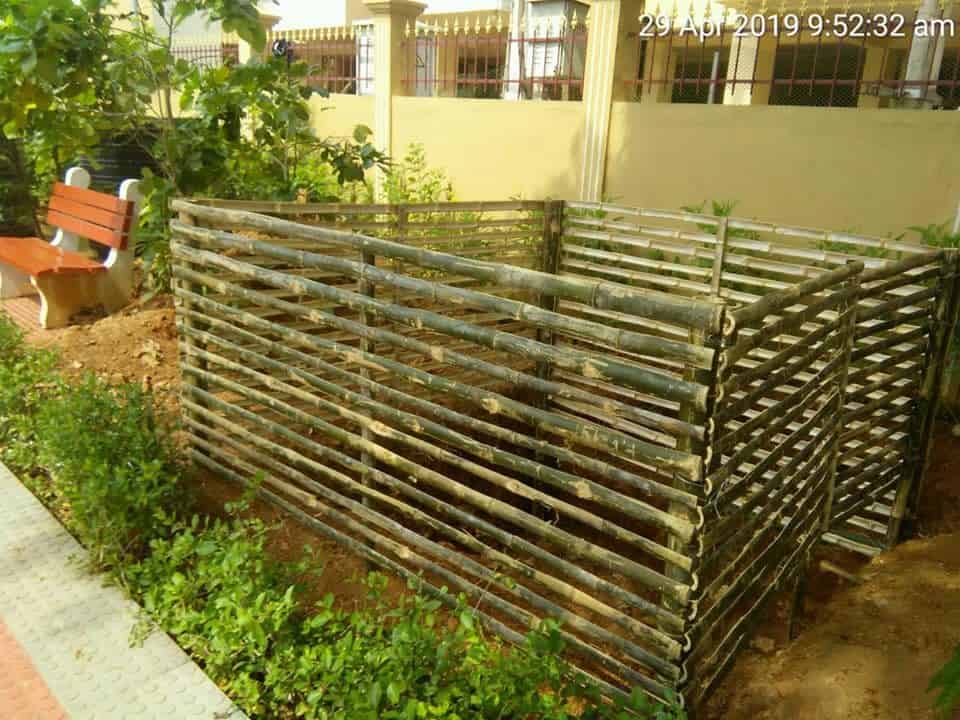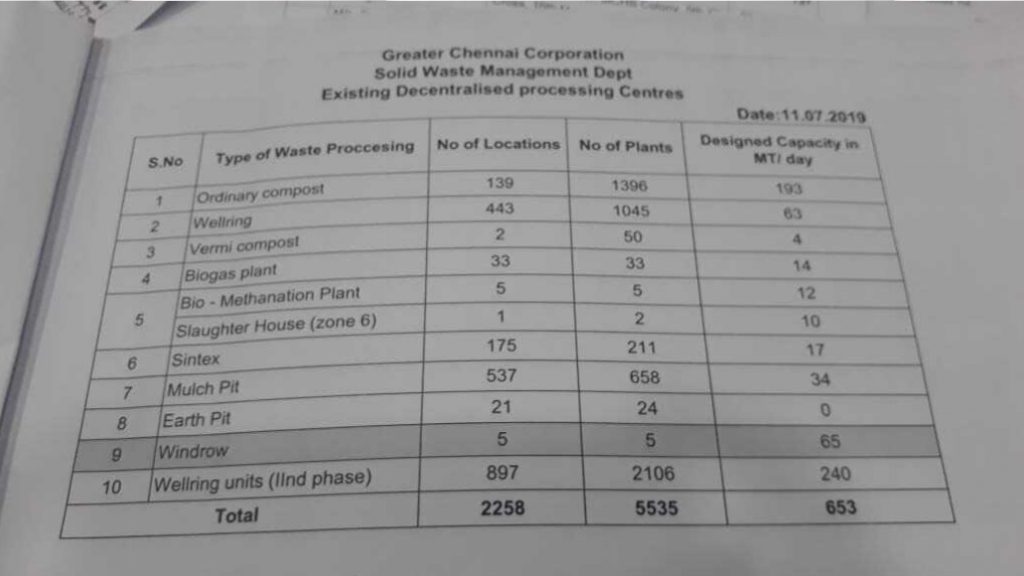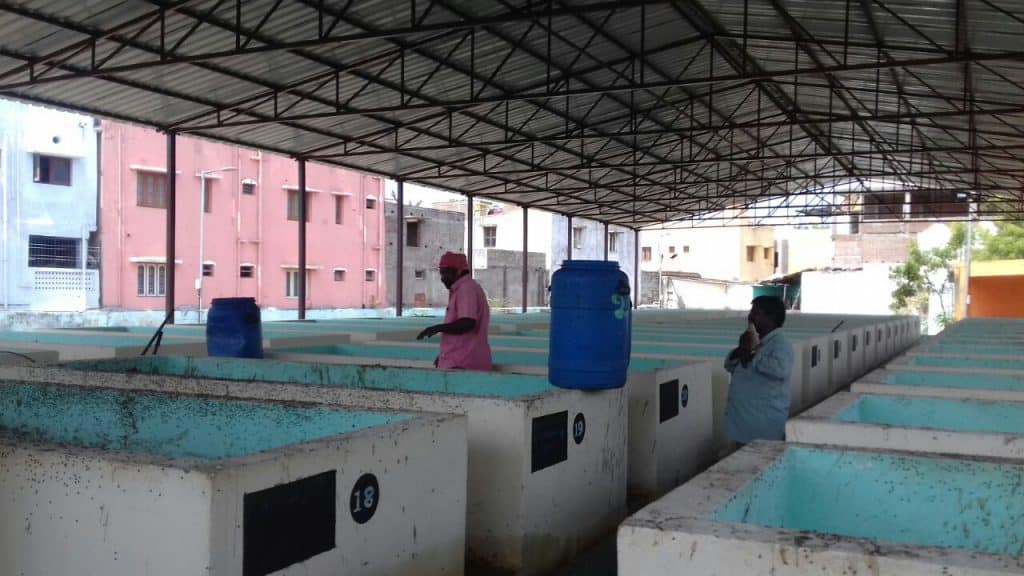Four months after the Greater Chennai Corporation (GCC) initiated serious action on waste reduction and management in the city, the civic body is beginning to see the results.
According to statistics obtained from Chennai Corporation, the daily average of garbage collected in Chennai has fallen from 5098 Metric Tonnes (MT) in March to 4493 MT in June, a reduction of 605 MT. In other words, Chennai Corporation is stopping an average of 18000 MT of waste from reaching the already burdened landfills of Perungudi and Kodungaiyur every month.

A graph showing a steady reduction in the waste that goes to the landfills in Chennai. Data source: Chennai Corporation. Graph: Aruna Natarajan
Roadmap to reduction
Here are the five steps being followed by Chennai Corporation to make the city Singara Chennai again:
1. Chennai Corporation is pushing 300 MT of dry waste every day to the 64 Material Recovery Facilities (MRF) and 90 Resource Recovery Centres (RRC). High-value waste such as cotton boxes and multilayer plastic are stored at the MRFs to be sent to cement and furniture units in Nagpur. Waste items such as Coconut shells are shredded at RRCs to be transported to the prawn culture centres in Kanyakumari.
“Thermocol is sent to recycling units in Sunguvarchatram, where it is melted and used in making buttons and artificial jewellery. Liquor bottles are sent back to the manufacturing companies. The Corporation is also identifying dry waste recyclers from across the country,” said I Priyadarshini of Wastewinn operators. Priyadarshini who is working on waste segregation in zones 14 and 15 is closely monitoring the Corporation’s initiative. According to the N Mahesan, Chief Engineer (Buildings and Solid Waste Management), 112 RRCs are being constructed in different parts of the city.
2. Around 500 MT of wet waste is composted every day through the decentralised processing centres. Corporation has ten types of wet waste processing units such as biogas plants, sintex tanks, mulch pits, earth pits, windrows and wellring units in 2258 locations across the city with a designated capacity of 653MT/day. 28 more facilities will be added shortly to process the wet waste, added Mahesan.
3. The Corporation has beefed up its waste collection practices by reducing dustbins in all wards. Conservancy workers were trained to collect segregated waste from households. The first step of success came recently when Manali (Zone 2) was declared a zero-waste zone. In a zero-waste zone, the segregated biodegradable and non-bio-degradable waste is processed and reused in such a manner that none or negligible amounts of it reach the landfills. The greatest challenge here is to get 60 per cent of Chennaiites to segregate waste as only 40 per cent of them do so now.
“We have also declared ward 200 of Zone 15 as zero waste. The Corporation will replicate these models in other zones to ensure that Chennai becomes zero waste by 2020. Intensive source segregation should happen with the active involvement of all stakeholders,” opined Mahesan. Bins in the city have been reduced to ensure door-to-door collection of waste.

Mulch pits have been set up in parks to collect leaf waste form the parks and street sweeping. Pic: Kuppai Matters
4. Although implementation on the ground has not been 100%, the civic body is persuading bulk waste generators such as restaurants, apartments and IT parks to process the waste in their own premises. While a few apartments such as S & S Sarvam comply, many of them are still dumping the unsegregated waste near the water bodies or in dustbins.
5. To sensitise citizens towards waste segregation, the Corporation has collaborated with organisations such as Citizen consumer and civic Action Group (CAG) and Trash troopers. “Every ward is divided into three parts. Sanitary officers and volunteers ensure that conservancy workers collect only segregated waste and create awareness for citizens on the same,” said Paul Pradeep, co-founder of Trash Troopers.
Revisit SWM rules
Chennai Corporation published the draft Solid Waste Management bylaws, 2016 last year to tighten the waste management procedure in the city. According to bylaws, the civic body can levy a fine of Rs 1000 on residential properties and Rs 25,000 on organisers, in case of non-segregation of waste. This is expected to change the deep-rooted habits among citizens and prompt them to follow waste segregation norms.
But can these SWM bylaws really enable a zero-waste Chennai by 2020? On condition of anonymity, a senior Corporation official said that the penalty might not go down well with voters and hence the rules may remain on paper for now. “It does not seem that the bylaws will be implemented anytime soon, and even if they are, the provision of penalty is most likely to be ruled out on political considerations. But, imposing fines is actually the only effective way to ensure compliance,” said the official.
It is clear that efforts by the civic body alone can aonly achieve so much. Citizens from all walks have to be sensitised and must work towards the zero waste goal. That’s the only way to ensure that our water bodies don’t turn into dumping grounds and our landfills don’t assume further proportions.


Really a pleasure to hear something Positive and pleasant about the efforts of GCC in the arena of Waste Management. With active participation of people, we can be a role model for the country.
Impressed with the nice reporting coverage and focus on City’s pressing issues
Waste is not segregated at source. Still waste collectors are dumping all things in a single vehicle.
Please tell the Chennai Corporation to look into the matter.